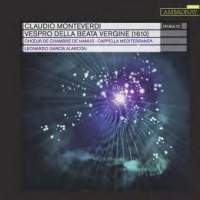Texte paru dans: / Appeared in:
*

GRAMOPHONE (08/2014)
Pour s'abonner /
Subscription information
Ambronay
AMY041

Code-barres / Barcode : 3760135100415
Consultez toutes les évaluations recensées pour ce cd
~~~~ Reach all the evaluations located for this CD
Reviewer:
Lindsay Kemp
This is in many ways a ‘traditional’ Monteverdi Vespers, carrying little in the way of musicological baggage. Performed in the published order with liturgical additions limited to short chant antiphons before the psalms, soloists interacting with a ripieno choir of 21, some extra instrumental doubling and a Magnificat at high pitch, its principal novelty is to have approached the problem of there being no set of chants both musically appropriate to the score and liturgically appropriate to any one feast day by selecting texts for the Nativity of the Blessed Virgin Mary and then writing new, pastiche chant melodies for them. They sound convincing enough to my inexpert ears; but more striking in any case is the manner in which they are sung, with Solesmes-style weediness rejected in favour of something more fullthroatedly coloured by southern European, Byzantine and Muslim traditions. The results are described here as ‘work in progress’, but again sound plausible and sincere, as well as echoing something of the inflected exoticism of Monteverdi’s vocal writing elsewhere.
Even so, it is probably not this that will decide listeners on the effectiveness of the performance. For that we have to consider the more fundamental matters of sound, interpretative skill and creative energy, and in all of these Leonardo García Alarcón and his forces score highly. Speeds are for the most part fast, yet never seem overdriven or scrambled – indeed, it is remarkable how effectively Alarcón manages successfully to marry his swift tempi in ‘Deus in adjutorium’, ‘Lauda Jerusalem’ or the ‘Sonata sopra Sancta Maria’ to alert and adroitly delivered rhythmic articulation and a satisfying weight of sound (boosted by an agile trombone department). Yet there are moments of tenderness too, tellingly employed as in the gentle, consolotary ‘Amen’ at the end of ‘Dixit Dominus’, or the ‘Et misericordia’ section of an otherwise purposefully driven Magnificat. The excellently sung solos, too, are islands of intimacy and poise. This is a Vespers that excites by the way it combines the immediacy and clarity of a smaller-scale performance with the sheer sonic thrill of a larger one, all in a pervading atmosphere of heartfelt but unhistrionic expressive urgency.
Cliquez l'un ou l'autre
bouton pour découvrir bien d'autres critiques de CD
Click either button for many other reviews


